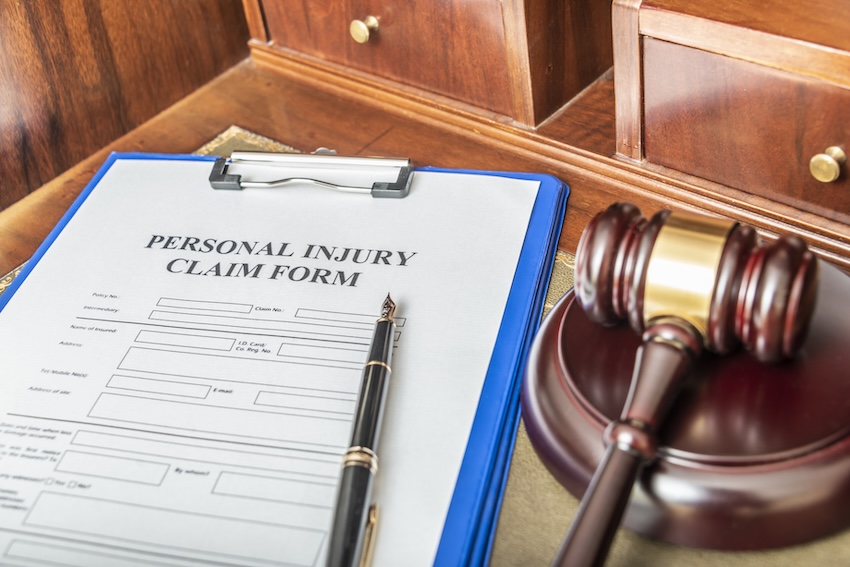Understanding Personal Injury Claim Types for Better Outcomes: A North Carolina Guide
Published by Mogy Law Firm | Reading Time: 5 minutes
Personal injury law covers a wide range of accident and injury scenarios. Understanding which type of claim applies to your situation determines your legal strategy, potential compensation, and path to justice. At Mogy Law Firm, our experienced personal injury attorneys have successfully handled every type of personal injury case across North Carolina, and we know that proper case classification is the first step toward securing maximum compensation.
Whether you’ve been injured in a car crash, hurt on someone else’s property, or harmed by a defective product, knowing your claim type helps you understand your rights, build stronger evidence, and negotiate effectively with insurance companies.
Timing matters in personal injury cases.
North Carolina law (G.S. § 1-52) generally gives you three years from the
date of injury to file most personal injury claims. Some claim types have different
deadlines—wrongful death claims must be filed within two years, and medical
malpractice has special discovery rules.
Understanding your specific claim type
ensures you don’t miss critical filing deadlines.
Motor Vehicle Accident Claims
Car, Truck, and Motorcycle Collisions
Motor vehicle accidents represent the most common personal injury claims in North Carolina. These cases involve cars, trucks, motorcycles, buses, and commercial vehicles. The key factor in these claims is proving the other driver’s negligence—whether through distracted driving, speeding, drunk driving, or violating traffic laws.
North Carolina’s contributory negligence rule makes vehicle accident cases particularly challenging. If the insurance company proves you were even one percent at fault, you lose your right to compensation entirely. This harsh standard means documentation is critical. Police reports, witness statements, traffic camera footage, and accident reconstruction become essential evidence.
Compensation in vehicle accident cases typically covers medical expenses, lost wages, vehicle damage, and pain and suffering. Severe crashes resulting in permanent disabilities or traumatic brain injuries often reach six-figure settlements or verdicts. However, insurance companies aggressively defend these claims, making experienced legal representation crucial for favorable outcomes.
Premises Liability Claims
When Property Owners Fail Their Safety Duties
Premises liability cases arise when property owners or managers fail to maintain safe conditions, leading to injuries. The most common type is slip and fall accidents, but premises liability also includes inadequate security, falling objects, elevator malfunctions, swimming pool accidents, and dog bites.
To succeed in premises liability claims, you must prove the property owner knew or should have known about the dangerous condition and failed to fix it or warn visitors. Evidence includes photographs of the hazard, incident reports, maintenance records, and witness testimony about how long the dangerous condition existed.
Shopping centers, grocery stores, restaurants, hotels, and apartment complexes have heightened duties to maintain safe premises for customers and tenants. When they breach these duties and cause injuries, they owe compensation for medical bills, lost income, and the physical and emotional toll of the injury.
Premises liability cases require quick action. Property owners often repair hazards immediately after accidents, destroying crucial evidence. Surveillance footage gets deleted. Witnesses disappear. Contacting an attorney within days of your injury preserves evidence and protects your rights.
Medical Malpractice Claims
Holding Healthcare Providers Accountable
Medical malpractice occurs when doctors, nurses, hospitals, or other healthcare providers deliver substandard care that causes injury or death. These are among the most complex personal injury claims, requiring extensive medical knowledge and expert testimony to prove negligence.
Common medical malpractice scenarios include misdiagnosis or delayed diagnosis of serious conditions like cancer or heart disease, surgical errors such as operating on the wrong body part or leaving instruments inside patients, medication errors involving wrong prescriptions or dosages, birth injuries causing cerebral palsy or Erb’s palsy, and anesthesia mistakes leading to brain damage or death.
North Carolina law requires medical malpractice plaintiffs to provide expert testimony from qualified medical professionals who can establish the accepted standard of care and explain how the defendant deviated from it. This makes these cases expensive and time-consuming, but the potential compensation reflects the severity of harm caused by medical negligence.
Medical malpractice claims in North Carolina must generally be filed within three years of the malpractice or one year from discovery of the injury, whichever occurs later. However, these deadlines have exceptions, making early consultation with a specialized attorney essential.
Workplace Injury Claims
Beyond Workers’ Compensation
Workplace injuries often involve workers’ compensation claims, which provide benefits regardless of fault but limit what you can recover. However, certain workplace situations allow personal injury lawsuits that provide fuller compensation, including pain and suffering.
You can file personal injury claims when third parties cause your workplace injuries. If you’re injured by a subcontractor’s negligence, defective equipment from a manufacturer, or a negligent driver while working, you may pursue compensation beyond workers’ compensation benefits. These third-party claims offer significantly higher recovery potential.
Additionally, if your employer intentionally caused your injury or lacked required workers’ compensation insurance, you might sue them directly. Construction accidents, industrial facility incidents, and truck driver injuries frequently involve both workers’ compensation and personal injury elements.
Workplace injury cases require careful analysis of employment relationships, insurance coverage, and liability sources. An experienced personal injury attorney identifies all available compensation avenues and maximizes your total recovery.
Product Liability Claims
When Defective Products Cause Harm
Product liability claims arise when defective or dangerous products cause injuries. Manufacturers, distributors, and retailers can all be held liable under three theories: design defects where products are inherently dangerous due to flawed design, manufacturing defects where products deviate from their intended design during production, and failure to warn when companies don’t provide adequate safety warnings or instructions.
Common product liability cases involve defective vehicles with faulty brakes or airbags, dangerous pharmaceuticals causing unexpected side effects, contaminated food products, defective medical devices like hip implants or pacemakers, unsafe children’s toys, and exploding electronics or appliances.
Product liability claims don’t require proving the manufacturer was negligent—strict liability applies. You only need to prove the product was defective and the defect caused your injury. This makes product liability claims more straightforward than traditional negligence cases, though they still require extensive evidence and often expert testimony.
Manufacturers have significant resources and aggressive legal teams defending product liability claims. They’ll argue you misused the product, weren’t injured as severely as claimed, or that something else caused your injuries. Strong legal representation ensures manufacturers are held accountable for dangerous products.
Wrongful Death Claims
Seeking Justice for Lost Loved Ones
Wrongful death claims arise when negligence causes someone’s death. These devastating cases allow surviving family members to seek compensation for funeral expenses, lost financial support, loss of companionship, and the emotional suffering of losing a loved one.
In North Carolina, the estate’s personal representative files wrongful death claims on behalf of surviving family members. Wrongful death can result from car accidents, medical malpractice, workplace accidents, defective products, nursing home abuse, or any other negligent conduct causing death.
These claims must be filed within two years of death. The emotional weight of wrongful death cases makes many families hesitate to pursue legal action, but holding responsible parties accountable prevents future tragedies and provides financial security for surviving family members struggling without their loved one’s income and support.
Wrongful death claims involve complex damages calculations, including the deceased’s expected lifetime earnings, household services they provided, and the intangible value of their presence in their family’s lives. Experienced attorneys ensure families receive full compensation reflecting their profound loss.
Why Claim Type Matters for Your Outcome
Understanding your claim type affects everything about your case. Different claims require different evidence—medical records and expert testimony for malpractice, accident reconstruction for vehicle crashes, property inspection reports for premises liability. Each claim type has unique deadlines, liability standards, and damages calculations.
Insurance companies adjust their defense strategies based on claim type. They know which cases typically settle and which go to trial. They know which types of evidence judges and juries find most persuasive. Without understanding your specific claim type, you can’t effectively counter their tactics.
Most importantly, claim type determines potential compensation. Some claims involve multiple liable parties or insurance policies, significantly increasing potential recovery. Others may qualify for punitive damages when defendants acted with gross negligence or malicious intent.
Get Expert Help for Every Claim Type
At Mogy Law Firm, we handle all personal injury claim types with the same commitment to excellence. Our attorneys understand the nuances of North Carolina personal injury law and how to maximize compensation regardless of how you were injured.
We offer free case evaluations where we’ll identify your claim type, explain your legal options, and outline a strategy for success. We work on contingency, meaning you pay nothing unless we win. And unlike most personal injury firms charging 33-40%, we charge just 25%—ensuring you keep more of your settlement.
Don’t let insurance companies minimize your claim because you don’t understand personal injury law’s complexities. Whether you were injured in a car accident, hurt on someone’s property, harmed by medical malpractice, or facing any other personal injury situation, we have the experience to fight for the compensation you deserve.
Call (901) 443-9133 now for your free consultation. Time is critical—evidence disappears, witnesses forget, and North Carolina’s statutes of limitations set strict deadlines. The sooner you call, the better your chances of a successful outcome.
You’ve suffered enough. Let us handle the legal battle while you focus on healing.
About Mogy Law Firm: Serving North Carolina personal injury victims throughout Raleigh, Concord, and surrounding communities. With decades of combined experience and a commitment to charging just 25% instead of typical 33-40% contingency fees, we ensure you receive maximum compensation for your injuries.








